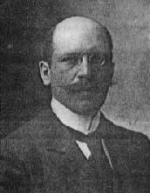The reason that the study of false confessions is such an important topic within forensic psychology is that research into the reliability of testimony and suggestibility is as old as the discipline itself.

Hugo Munsterberg
In 1908 Hugo Munsterberg published 'On The Witness Stand: Essays on Psychology And Crime'. One of these essays was entitled 'Untrue Confessions'. The writing of Hugo Munsterberg was not only groundbreaking but also very perceptive. In the first sentence of his essay on false confessions he stated that:
I am most seriously convinced that it is a tragedy not only of crime but also of human error and miscarried justice, and my scientific conscience as a psychologist compels me to speak of it because the tragedy of yesterday may come up again, in some other form, tomorrow

John Mark Karr
Munsterberg's contention that false confessions were a normal phenomena triggered by unusual circumstances was most recently brought to light in the circumstances surrounding the John Mark Karr case. In relation to the unsolved murder of six-year-old JonBenét Ramsey, John Mark Karr claimed that he was present when Ramsey died and that her death was an accident. Authorities were made aware of Karr via the e-mail correspondence he had with Michael Tracey, a journalism professor at the University of Colorado. Karr was arrested in Bangkok returned to the USA for questioning. Shortly after, prosecutors announced they would not be pursuing charges in connection with the murder after DNA tests failed to place Karr at the scene.
Theoretical explanations for the psychology of false confessions
The work of Kassin and Wrightsman in the USA and Gudjonsson in the UK has done a great deal to further our understanding of the psychology of false confessions. To find out more about this work, along with links to a number of excellent resources on the subject of false confessions visit the main forensic psychology website.
Click Here To See The False Confessions Webpage

No comments:
Post a Comment